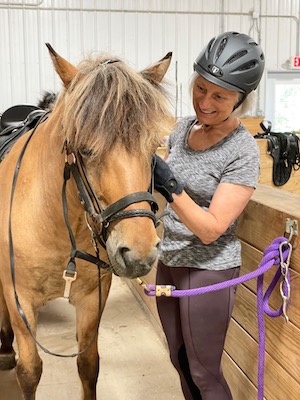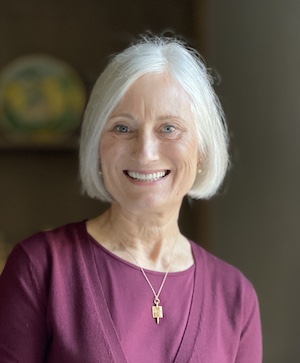By Ethan Liu
“Whenever I fly, I choose a window seat because I enjoy viewing the pattern of landscapes and contemplate the geologic processes that formed them,” said geologist Janet Bauder Thornburg (ΦBK, Stanford University). Beginning with Bauder family camping trips and hikes in Yosemite when she was a child, Janet was captivated by the majestic scenery that the outdoors offered. The calming presence of wildlife, towering trees, even far-reaching landscapes fascinated her endlessly. This motivated her to pursue a career where she could freely travel and explore exotic regions to better understand rock formations, landforms, and other geological features. “In hindsight, I realize that geology enabled me to apply my aptitude in science with my interest in history (albeit earth history),” Thornburg recalled. “The visual beauty of geologic phenomena also sustains my passion for the subject.” To further explore this field, Janet Bauder Thornburg pursued her bachelor’s and master’s degrees in geology at Stanford University, where she was inducted into Phi Beta Kappa in 1974. For her M.S. thesis, she mapped and interpreted the metamorphic petrology of the Franciscan Complex and associated rocks in the Diablo Range, California. She presented her results at the 1976 convention of the Geological Society of America (GSA) and subsequently published her research in the GSA Bulletin. Thornburg expressed that her contributions were “an exciting way to start off my geological career.”
Thornburg began her career as a petroleum geologist with Conoco, Inc., working as a wellsite geologist and preparing subsurface maps of Cretaceous sandstones in the Powder River Basin, Wyoming. In the early 1980s, she worked as a research intern for Marathon Oil Company, where she specialized in diagenesis and provenance of Cretaceous and Tertiary sandstones in Southern California. In 1990, she received her doctoral degree from University of Colorado at Boulder, where her research focused on the petrography, sedimentology, and sequence stratigraphy of Permian sandstones, phosphorites, carbonates, and cherts in southwest Montana and northwest Wyoming. The following year, Thornburg joined Texaco’s Exploration and Production Technology Division where she applied her expertise to projects in South America, China, and Indonesia. She also co-taught Texaco’s sandstone reservoir workshops, which included lectures and field trips to modern and ancient sedimentary environments. She describes teaching as “incredibly satisfying… to share my joy and excitement about geology with very intelligent, curious scientists.” Finally, as senior geologist at Nautilus World, she proposed and facilitated development of training courses in petroleum geoscience and engineering. With her deep understanding of depositional environments and subsurface geology, Thornburg can easily find clues when asked about the connection between geology and environmental issues. She stressed “the importance of understanding geologic processes in order to understand, anticipate, and possibly mitigate the impacts of climate change.” For example, excessive agricultural activities in the Great Valley of California “hasten depletion of groundwater,” she explained. “Drought conditions related to climate change further exacerbate the depletion of groundwater.”

In 2016, Thornburg retired from her work in geology and moved to Ann Arbor, Michigan. While considering volunteer opportunities, she recalled her rewarding experiences as president of the Stanford alumni clubs in Denver and Houston. She especially “enjoyed the cross-generational interaction” of the Stanford alumni groups. When Thornburg learned that the Phi Beta Kappa Greater Detroit Association needed rejuvenation, she joined the board as vice president for membership to boost engagement and foster a greater sense of community. One major step forward was transitioning from postal mail to bulk email in order to increase outreach from hundreds to thousands of ΦBK members in southeast Michigan. Thornburg instituted online payment of dues, scholarship donations, and event registrations. She also devoted much time to regularly maintaining the association’s website “to really improve how we communicate with members to make it easier for them to learn about us,” she said. Additionally, Thornburg helped organize educational and cultural activities to bring local alumni together for networking and intellectual discussions. For example, the Greater Detroit Association organized a well attended tour and lunch at the Flint Museum of Arts in fall 2021. Presently, Janet Bauder Thornburg serves Phi Beta Kappa as president of the Greater Detroit Association and chair and senator for the East Central District.
Although much of her life was devoted to the sciences and specialized study of geology, Thornburg remains curious and eager to learn about different subjects. “From about my mid 40s onwards, I made a point in my lifelong learning to fill in the gaps of the humanities and arts,” explained Thornburg. “Getting that bigger picture has expanded and enriched my life.” In her daily life, there are enriching conversations about a variety of fascinating topics when she shares meals with family and friends. Her newest passion is learning to horseback ride in order to participate in a multi-day horseback trek in Iceland. She takes weekly riding lessons near Ann Arbor and travels occasionally to Icelandic horse farms in Kentucky and Iowa for daily riding lessons. Ultimately, Thornburg conveys that learning about the liberal arts and humanities helps one become flexible, open to different perspectives, and develop critical thinking. “We all bring different perspectives and experiences, and yet, we are all united by a real love of learning.”
Ethan Liu is a junior at University of California, Santa Barbara majoring in global studies. He was inducted into Phi Beta Kappa there in June 2022. The University of California, Santa Barbara is home to the Lambda of California chapter of Phi Beta Kappa.




